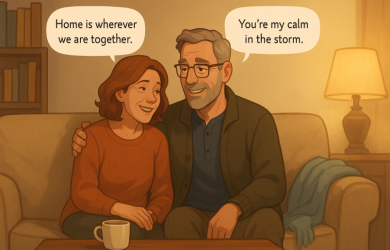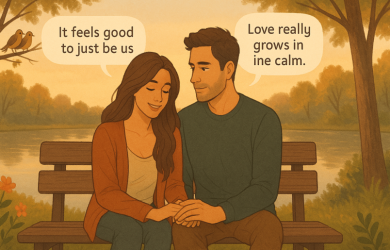10 Ways to Make an Androgynous Person Feel Seen in a Relationship

Heal & Grow Daily for a Happier Relationship
Subscribe FREEKey Takeaways
Marriage.com AI Quick Summary
Some people do not fit neatly into the boxes the world tries to place them in—and that is part of what makes them so special. When someone carries both softness and strength, warmth and edge, all in the same breath… it can be hard to describe but easy to feel.
You might not always have the right words, and that is okay. Sometimes, the most meaningful things are felt rather than defined.
In a relationship, that quiet recognition—”I see you, just as you are”—can mean everything. It is not about labeling or guessing; it is about being present, open, and kind.
If you love or care deeply for an androgynous person, showing that you truly see them is not about grand gestures—it is about the little things that tell them, “You do not have to explain yourself here.”
What is an androgynous person in a relationship?
An androgynous person in a relationship might not follow the typical patterns people expect—and that can be a beautiful thing.
They may blend traditionally “masculine” and “feminine” energies in ways that feel natural, fluid, and deeply personal. This balance can show up in how they dress, speak, express love, or handle emotions.
They are not trying to be confusing or elusive; they are simply being real. An androgynous persona is not about putting on a show—it is about being true to themselves in every space, including love.
You might notice:
- They do not rely on gender roles to define connection
- Comfort and authenticity guide their expression
- Androgynous personality traits include emotional flexibility, calm strength, or thoughtful sensitivity
And honestly… that mix is something to be cherished. It brings a quiet kind of depth to love—one that asks to be felt, not categorized.
9 ways to make an androgynous person feel seen in a relationship
When someone has an androgynous personality, it means they often carry a mix of traits that do not fit into traditional gender molds. This can be refreshing but also easy to overlook if someone is not paying close attention. Being seen—truly seen—is more than being noticed.
It is about feeling safe to exist as yourself without needing to explain every part of who you are. Here are a few thoughtful ways to offer that kind of presence and care in your relationship.
1. Listen without filtering them through gender roles
Do not assume they think, feel, or act a certain way just because of how they appear. An androgynous person may express emotions or make decisions in ways that blend softness and strength.
Let them show you who they are without trying to decode it through traditional lenses. If they cry, it does not mean they are fragile. If they are bold, it does not mean they are trying to be masculine. Simply hear them out as they are.
- Do this instead
Ask open-ended questions like “What are you feeling right now?” instead of interpreting their behavior through stereotypes.
Let their words define them—not your assumptions. This shows them you are willing to meet them where they are, not where society tells you they should be.
2. Compliment more than just their looks
Sure, tell them they look amazing—but do not stop there. Androgynous individuals often put care into how they show up in the world, and that includes more than appearance.
Compliment their presence, their energy, or how they make you feel when they walk into the room. Say things like, “I love the way you think,” or “You make things feel calm just by being here.” Let your words reflect how deeply you notice them.
- Do this instead
Offer compliments like “Your energy grounds me” or “You are easy to be around.” Recognize traits that go beyond the surface—they are often what matters most.
These affirmations stay with them longer because they speak to who they are, not just how they appear.
Studies indicate that receiving compliments from a partner can activate reward pathways in the brain, leading to feelings of happiness and a deeper emotional connection. In addition, when someone begins to view compliments as lasting expressions of affection from their partner, it can help build feelings of emotional safety and contentment.
3. Do not make them explain their identity over and over
Some people feel the need to ask “what” someone is, especially when they cannot label them quickly. Resist that. Being with an androgynous person means holding space for ambiguity without needing constant definitions.
If they offer to explain—listen. But never demand clarity just to satisfy your own discomfort. Their identity is not a puzzle to solve; it is a person to love.
- Do this instead
Say, “You do not owe me any explanation—I am just glad to know you.” Let comfort take priority over curiosity when it comes to their identity.
It tells them your love does not come with conditions or a constant need to define.
4. Be mindful of your language
Little things add up. Calling them “girly” or “manly” in passing, even as a joke, can feel like a dismissal of the balance they are trying to live in. Use words that affirm who they are without boxing them in.
Try asking what words feel best when you talk about them in front of others. It is not about walking on eggshells—it is about being thoughtful and kind with your words.
- Do this instead
Ask gently, “Is there a way you’d like me to describe you to others?”
Then, honor that choice with consistency and warmth, both in private and public. It reminds them you are not just listening—you are adapting because you care.
5. Celebrate both strength and sensitivity
Androgynous people often possess what some see as opposites—gentleness and boldness, logic and emotion, softness and resilience. Instead of picking one to praise, embrace all of them.
Say things like, “I admire how gentle you are with others” or “Your strength makes me feel safe.” Let them know they do not have to shrink or choose one side just to be accepted.
- Do this instead
Affirm both traits with something like, “You are strong and soft—both make you beautiful.” Let them know they never have to choose one over the other.
Your acceptance gives them permission to fully show up as themselves without trimming parts away.
6. Allow them to express love in their own way
They might not always follow traditional gender-coded love languages. An androgynous person may show affection through quiet actions, thoughtful gestures, or non-verbal connections.
Let go of expectations around how love “should” look and instead tune in to how they naturally give and receive it. When you recognize their style without trying to reshape it, they will feel more at ease—and more seen.
- Do this instead
Notice how they show up—through actions, words, or presence—and reflect it back.
Say, “I see how you care for me, even when you do not say it.” It teaches them that their love language is heard and valued, even in its quieter forms.
7. Respect their evolving self
Identity is not fixed, especially for someone with an androgynous personality. Their way of expressing themselves may shift over time—and that is okay. What matters most is how you respond to those shifts.
Celebrate their growth, ask how you can support them, and never hold them hostage to who they were six months ago. Presence means showing up for who they are today.
- Do this instead
Say, “You are allowed to change—just let me know how to show up with you.” Give them space to grow without needing them to stay the same.
That kind of support feels like freedom—it tells them you are not here just for a version of them but for the journey.
8. Affirm them in public as well as private
It means a lot to be seen in intimate moments—but it also matters when others are around. An androgynous person may feel overlooked or misunderstood in social situations.
A kind touch, a word of affirmation, or standing beside them in conversation can say, “I am with you. I see you.” It is not about putting on a show—it is about offering quiet reassurance where it counts.
- Do this instead
Use their chosen name and pronouns in public spaces. Offer small physical affirmations—a touch on the arm, eye contact, or a reassuring smile during group conversations.
Those quiet acts send a loud message: “You are not invisible here—you are cherished.”
9. Let your love be a place where they can exhale
The world can be loud, judgmental, or just too quick to label. Your relationship should be the opposite. A place where they do not have to explain, shrink, or mask anything.
Just a soft, steady space where they are welcome to show up—fully, freely, and without fear. When you offer that kind of love, you give them something rare: peace.
- Do this instead
Say, “You do not have to be anything else here—just you.” Create space for stillness, silence, or softness when the world asks too much of them.
When love feels like rest, it becomes the one place where healing can actually happen.
Why is it important to make an androgynous person feel seen?
It is not always about grand gestures—sometimes, being seen simply means being understood. For an androgynous person, that feeling can be especially rare in a world that leans heavily on labels.
When someone takes the time to recognize them truly, it creates a soft, steady kind of safety… the kind that allows a person to exhale and be. Here is why that matters more than most people realize.
-
It validates their identity without conditions
When someone sees and accepts an androgynous person for who they are, it sends a quiet but powerful message: “You do not have to explain yourself to be loved.”
That kind of affirmation is healing. It tells them they are enough as they are—no edits, no masks. And that simple truth can lift a lifelong weight.
-
It protects them from feeling invisible
Androgynous people often slip through the cracks of rigid gender expectations. Being seen means they are no longer overlooked or misunderstood.
It gives them a presence in spaces that often ignore nuance. That presence matters—it tells them they belong.
-
It builds emotional safety in the relationship
When someone knows they can be fully themselves without being judged or questioned, it builds trust. For an androgynous person, emotional safety is not a luxury—it is a need.
Research shows that emotionally secure relationships are associated with better psychological well-being, increased relationship satisfaction, and more positive interactions.
Feeling seen lowers their guard and invites deeper connection. That kind of openness becomes the heart of any strong relationship.
-
It allows them to express love more freely
Love looks different for everyone. When an androgynous person feels truly seen, they no longer second-guess how they express affection.
Their gestures come from a place of comfort, not fear. And in that space, love becomes something honest, open, and beautifully personal.
-
It shows them they do not have to perform
So many people spend their lives performing—trying to fit molds they never chose. Making an androgynous person feel seen gives them the freedom to step off that stage.
It says, “You do not have to perform here; you can just be.” And that kind of love… is rare but unforgettable.
Can an androgynous personality influence relationship dynamics?
An androgynous personality can gently shift the rhythm of a relationship. When someone blends traditionally “masculine” and “feminine” traits—like being both emotionally attuned and confidently direct—it opens the door to a more balanced connection.
Imagine a partner who listens deeply but also knows when to step in with strength. That kind of presence softens rigid roles and invites both people to show up fully without performing.
Over time, it creates a dynamic that feels more equal, more intuitive, and more human—where support is shared, and love is expressed in ways that feel natural rather than scripted.
Watch this video featuring psychotherapist Esther Perel as she shares her insights on truly accepting and loving your partner:
Parting words
Seeing someone—truly seeing them—is not about grand declarations. It is in the quiet, consistent ways we make space for who they are… without asking them to shrink or explain.
An androgynous person carries a blend that does not always fit neatly into boxes, and that is part of their beauty.
So when love shows up with curiosity, care, and no need to label—something special happens. It feels safe. It feels right. And most of all, it feels like home.
Want a healthier, happier relationship - one step at a time?
 Tips
Tips
Write your tip or submit a video tip
All tips are reviewed before the publishing.
Share this article on
Recent Articles
Related Quizzes
Heal & Grow Daily for a Happier, Healthier Relationship
Subscribe FREE on YouTube We'd love your feedback!
We'd love your feedback!
 Expert Q&A
Expert Q&A
Ask your question related to this topic & get the support you deserve from experts.


 Reviewed by
Reviewed by
















 Thanks for your feedback!
Thanks for your feedback!